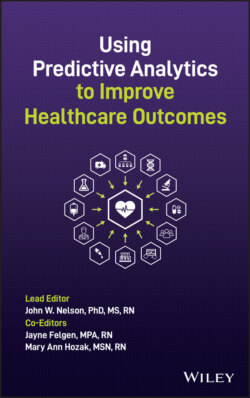Читать книгу Using Predictive Analytics to Improve Healthcare Outcomes - Группа авторов - Страница 11
Оглавление
Foreword
John W. Nelson and his colleagues are to be congratulated for creating this distinctive book. A very special feature of the book is the use of predictive analytics to explain, amplify, and validate caring theory. All too often, publications focusing on methods such as predictive analytics ignore the theoretical frameworks that guide the collection of data to which analytics are applied. The reader is then left with the thought, “Perhaps interesting results, but so what?” This book provides the answer to “so what?” by presenting the very interesting results, within the contexts of caring theory, specifically Relation‐Based Care®, the Caring Behaviors Assurance System©, and Watson’s Theory of Transpersonal Caring.
The book’s content emphasizes quality improvement, which might be considered the most appropriate application of predictive analytics in healthcare. Determining how, when, and why to improve the quality of healthcare, as a way to improve individual‐level and organization‐level outcomes, is a major challenge for all healthcare team members and researchers. Theory‐based predictive analytics is an innovative approach to meeting this challenge.
A challenge for the authors of the chapters of this book, and for its readers, is to determine the most appropriate place for theory in the triad of data, theory, and operations. Given my passion for the primacy of theory, I recommend that the starting point be theory, which determines what data is to be collected and how the data can be applied to operations.
The case studies that make up the several chapters of Sections Two and Four of this book, the contents of which are as interesting as they are informative, help readers to appreciate the value of theory‐based predictive analytics. The case studies, which range from individual‐level problems to department‐level problems to health system‐level problems, underscore the wide reach of theory‐based predictive analytics.
I contend that the ultimate challenge of predictive analytics will be to carry out the theoretical and empirical work needed to test the book editors’ claim, in the Preface of this book, that the same formulas helping people in the trucking and mining industries to create profiles of risk that enable them to prevent unwanted outcomes before they happen, can be applied successfully to improve healthcare outcomes. Meeting this challenge will undoubtedly extend the knowledge of our discipline, which many of us now refer to as nursology (see https://nursology.net).
Jacqueline Fawcett, RN, PhD, ScD (hon), FAAN, ANEF
Professor, Department of Nursing, University of Massachusetts Boston
Management Team Facilitator, https://nursology.net
